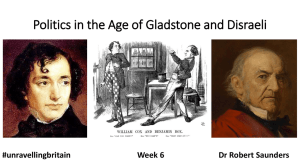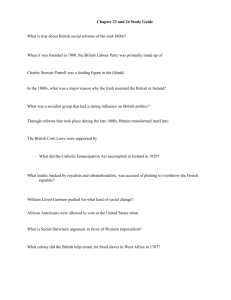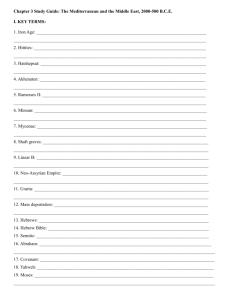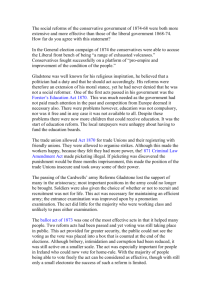Petr Kalný, MCR-A
advertisement
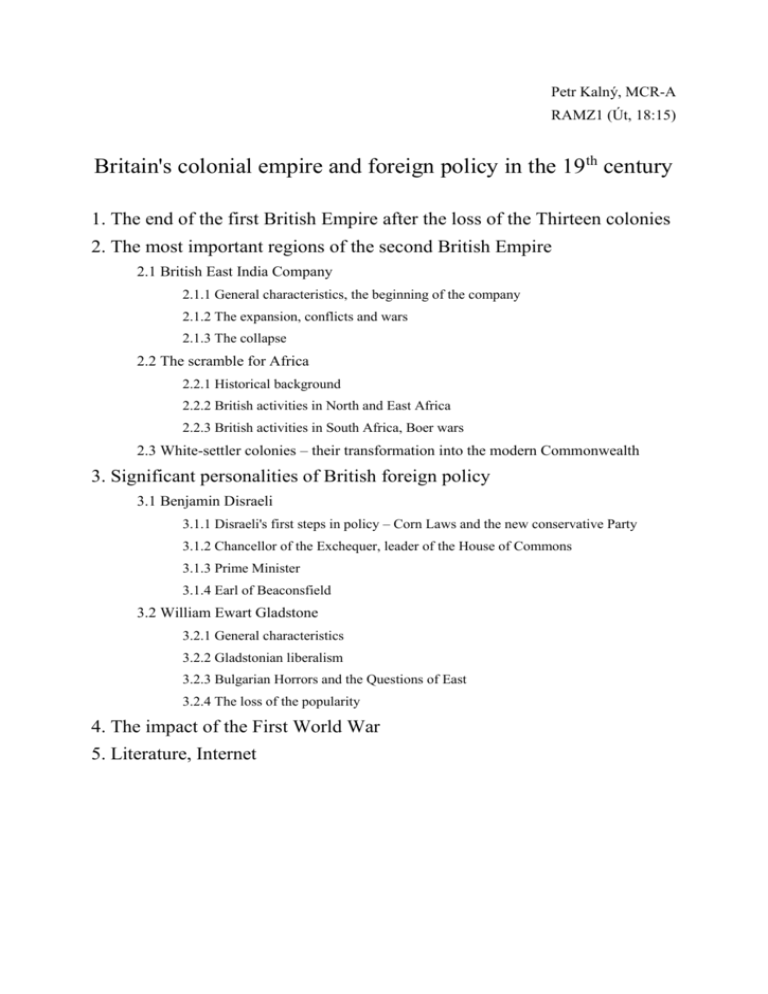
Petr Kalný, MCR-A RAMZ1 (Út, 18:15) Britain's colonial empire and foreign policy in the 19th century 1. The end of the first British Empire after the loss of the Thirteen colonies 2. The most important regions of the second British Empire 2.1 British East India Company 2.1.1 General characteristics, the beginning of the company 2.1.2 The expansion, conflicts and wars 2.1.3 The collapse 2.2 The scramble for Africa 2.2.1 Historical background 2.2.2 British activities in North and East Africa 2.2.3 British activities in South Africa, Boer wars 2.3 White-settler colonies – their transformation into the modern Commonwealth 3. Significant personalities of British foreign policy 3.1 Benjamin Disraeli 3.1.1 Disraeli's first steps in policy – Corn Laws and the new conservative Party 3.1.2 Chancellor of the Exchequer, leader of the House of Commons 3.1.3 Prime Minister 3.1.4 Earl of Beaconsfield 3.2 William Ewart Gladstone 3.2.1 General characteristics 3.2.2 Gladstonian liberalism 3.2.3 Bulgarian Horrors and the Questions of East 3.2.4 The loss of the popularity 4. The impact of the First World War 5. Literature, Internet 1. The end of the first British Empire after the loss of the Thirteen colonies in the 18th century, during the long period of unbroken Whig dominance of domestic political life (1714 – 1762), the Empire became less important, which ended with the American War of Independence (1775 – 1783), depriving Britain of her most populous colonies this period is sometimes referred to as the end of the "first British Empire", indicating the shift of British expansion from the Americas in the 17th and 18th centuries to the "second British Empire", focused more on Asia and Africa, which expanded especially in the 1800s and early 1900s and reached its apex at the end of World War I. 2. The most important regions of the second British Empire 2.1 British East India Company 2.1.1 General characteristics, the beginning of the company the British East India Company was probably the most successful chapter in the British Empire's history it was responsible for the colonisation of the Indian subcontinent, which would become the British Empire's largest source of revenue, along with the conquest of Hong Kong, Singapore, Ceylon, Malaya and other surrounding Asian countries, and were thus responsible for establishing Britian's Asian empire, the most important component of the British Empire it originally began as a joint-stock company of traders and investors, which was granted a Royal Charter by Elizabeth I in 1600, with the intent to favour trade privileges in India 2.1.2 The expansion, conflicts and wars its main expansion began in 1757, after the decline of the Mughal Empire, which had separated into many smaller states controlled by local rulers who were often in conflict with one another the Company came into the conflict with the Nawab of Bengal, Siraj Ud Daulah and under the leadership of Robert Clive, defeated him on 23th June 1757 at the Battle of Plassey, mostly due to the treachery of the Nawab's former army chief Mir Jafar; this victory, which resulted in the conquest of Bengal, established the British East India Company as a military as well as a commercial power, and marked the beginning of British rule in India => by the 1850s, the Company ruled over most of the Indian subcontinent and as a result, the Company began to function more as a nation and less as a trading concern there were many local wars in the course of time, the Company was e.g. responsible for the illegal Opium trade with China against the Qing Emperor's will, which led to the two Opium Wars (between 1834 and 1860); as a result of the Company's victory in the First Opium War, it established Hong Kong the most difficult for the Company were probably the three Anglo-Afghan Wars (between 1839 and 1919) against Afghanistan, which were mostly unsuccessful 2.1.3 The collapse the Company's rule came to an end 100 years after its conquest since 1757, when in 1857 Indians began an armed uprising against their British commanders, after a period of political unrest triggered by a number of political events one of the major factors was the Company's introduction of the Lee-Enfield rifle, where its cartridges, which were covered by greased cow fat and pig fat, were supposed to be cut by the teeth before the cartridges were loaded into the rifles; however, cow fat was forbidden for the Hindu soldiers, while pig fat was forbidden for the Muslim soldiers, so they had to either "bite the bullet" or resist their commanders another factor was the execution of the Indian sepoy Mangal Pandey who was hanged for attacking and injuring his British superiors these factors combined with a number of other reasons resulted in the Mutiny, which eventually brought about the end of the British East India Company's regime in India, and instead led to 90 years of direct rule of the Indian subcontinent by Britain, after the British East India Company was dissolved => the period of direct British rule in India is known as the British Raj, when the regions of India, Pakistan and Bangladesh were collectively known as British India 2.2 The scramble for Africa 2.2.1 Historical background in 1875 the two most important European holdings in Africa were Algeria and the Cape Colony; by 1914 only Ethiopia and the republic of Liberia remained outside formal European control the transition from an "informal empire" of control through economic dominance to direct control took the form of a "scramble" for territory by the nations of Europe Britain tried not to play a part in this early scramble, being more of a trading empire rather then a colonial empire; however, it soon became clear it had to gain its own African empire to maintain the balance of power and in 1914 Britain took nearly 30% of Africa's population under her control, compared to 15 per cent for France, 9 per cent for Germany, 7 per cent for Belgium and 1 per cent for Italy; Nigeria alone contributed 15 million subjects, more than in the whole of French West Africa or the entire German colonial empire as French, Belgian and Portuguese activity in the lower Congo River region threatened to undermine orderly penetration of tropical Africa, the Berlin Conference of 1884 – 1885 decided to regulate the competition between the powers by defining "effective occupation" as the criterion for international recognition of territorial claims 2.2.2 British activities in North and East Africa Britain's 1882 military occupation of Egypt (itself triggered by concern over the Suez Canal) contributed to a preoccupation over securing control of the Nile valley, leading to the conquest of the neighbouring Sudan in 1896 – 1998 and confrontation with a French military expedition at Fashoda in September 1898 in East Africa, British explorers were active from the 1850s in the search for the source of the Nile, and in 1864 Sir Samuel Baker discovered Lake Albert; the acquisition of Uganda in 1894 eventually secured Britain’s political dominance in the region and about the same time, British settlement in Kenya began 2.2.3 British activities in South Africa, Boer wars the activities of Cecil Rhodes, who was the pioneer of British expansion into South Africa with his privately owned British South Africa Company, led to the annexation of Bechuanaland in 1885 and the founding of Rhodesia in 1890 Rhodes' dream of a railway connecting Cape Town to Alexandria passing through a British Africa covering the continent is what led to his company's pressure on the government for further expansion into Africa the most resolute opponents of British expansion were the Boers of the Transvaal and the Orange Free State in southern Africa, until the British finally defeated them in the Boer War (1899 – 1902) 2.3 White-settler colonies – their transformation into the modern Commonwealth British empire had already begun its transformation into the modern Commonwealth with the extension of Dominion status to the already self-governing colonies of Canada (1867), Australia (1901), New Zealand (1907), Newfoundland (1907), and the newly-created Union of South Africa (1910) leaders of the new states joined with British statesmen in periodic Colonial conferences, the first of which was held in London in 1887 the foreign relations of the Dominions were still conducted through the Foreign Office of the United Kingdom, e.g. Canada created a Department of External Affairs in 1909, but diplomatic relations with other governments continued to be channelled through the Governors-General, Dominion High Commissioners in London and British legations abroad; Britain's declaration of war in World War I applied to all the Dominions nevertheless, the Dominions did enjoy a substantial freedom in their adoption of foreign policy where this did not explicitly conflict with British interests – e.g. Canada's Liberal government negotiated a bilateral free-trade Reciprocity Agreement with the United States in 1911, but went down to defeat by the Conservative opposition in defence, the Dominions' original treatment as part of a single Empire military and naval structure proved unsustainable as Britain faced new commitments in Europe and the challenge of an emerging German High Seas Fleet after 1900 in 1909 it was decided that the Dominions should have their own navies, reversing an 1887 agreement that the Australasian colonies should contribute to the Royal Navy in return for the permanent stationing of a squadron in the region 3. Significant personalities of British foreign policy 3.1 Benjamin Disraeli 3.1.1 Disraeli's first steps in policy – Corn Laws and the new conservative Party Benjamin Disraeli became known in Parliament for his defense of the protectionist Corn Laws, in opposition to Sir Robert Peel's, who was the then Prime Minister, advocacy of free trade, which Disraeli denounced as "laissez-faire capitalism" the end of 1845 and the first months of 1846 were dominated by the battle in parliament between the free traders and the protectionists Disraeli lost the fight, but the repeal of the Corn Laws came at great political cost as the Conservative Party split in half Peel and his followers, known as Peelites, moved towards the Whigs, while the new Conservative Party formed around the protectionists, led by Disraeli, Lord George Bentinck, and Lord Stanley (later Lord Derby) 3.1.2 Chancellor of the Exchequer, leader of the House of Commons in 1852 Lord Derby appointed Disraeli Chancellor of the Exchequer and Leader of the House of Commons; due to a combination of bad timing and a lack of experience, Disraeli's first Budget was a failure his duel, nonetheless, with William Ewart Gladstone over the Budget marked the beginning of thirty years of parliamentary hostility Derby's government fell after a few months and Disraeli left government; Gladstone succeeded him as Chancellor (and he was far more successful in that position) in 1858, Derby returned to the office of the Prime Minister and again appointed Disraeli his Chancellor of the Exchequer and government leader of the House of Commons with responsibilities to introduce reforms to parliament but his reforms would have disenfranchised some voters in the towns and were opposed by the Liberals and defeated the ministry fell in 1859 and Disraeli returned to the opposition bench until 1866 when he again became Chancellor of the Exchequer and government leader in the House of Commons after engineering the defeat of a Liberal Reform Bill introduced by Gladstone in 1866, Disraeli and Derby introduced their own measure in 1867 3.1.3 Prime Minister Lord Derby's health had been declining for some time and he finally resigned as Prime Minister in late February of 1868 there was no doubt about Disraeli succeeding Derby as leader of the Conservative Party and therefore Prime Minister; as Disraeli remarked, "I have climbed to the top of the greasy pole." however, in the election that followed, William Gladstone and the Liberals were returned to power with a majority of 170 after six years in opposition, Disraeli and the Conservative Party won the election giving the party its first absolute majority in the House of Commons since the 1840s Disraeli's government introduced various reforms such as the Artisans Dwellings Act (1875), the Public Health Act (1875), the Pure Food and Drugs Act (1875), the Climbing Boys Act (1875), the Education Act (1876), a new Factory Act meant to protect workers, the Conspiracy and Protection of Property Act (1875) to allow peaceful picketing and the Employers and Workmen Act (1878) to enable workers to sue employers in the civil courts if they broke legal contracts 3.1.4 Earl of Beaconsfield Disraeli was a main personality of the New Imperialism in Great Britain and helped strengthen the British Empire with his support for the construction of the Suez Canal he also achieved a diplomatic success at the Congress of Berlin in 1878 in limiting the growing influence of Russia in the Balkans and breaking up the League of the Three Emperors in 1876 was Disraeli elevated to the House of Lords in 1876 when Queen Victoria made him Earl of Beaconsfield however, difficulties in South Africa and Afghanistan weakened his government and likely led to his party's defeat by William Gladstone's Liberals in the 1880 general election Disraeli became ill soon after and died in April 1881 3.2 William Ewart Gladstone 3.2.1 General characteristics William Ewart Gladstone a notable political reformer, known for his populist speeches, was for many years the main political rival of Benjamin Disraeli he was four times British Prime Minister (1868–1874, 1880–1885, 1886 and 1892– 1894) Gladstone was famously at odds with Queen Victoria for much of his career, she once complained: "He always addresses me as if I were a public meeting" by his supporters was affectionately known as the "Grand Old Man" or "The People's William" 3.2.2 Gladstonian liberalism characterised by a number of policies intended to improve individual liberty and loosen political and economic restraints Gladstone's first premiership instituted reforms in the Army, Civil Service and local government to cut restrictions on individual advancement; he instituted the abolition of the sale of commissions in the army and court reorganization in foreign affairs his over-riding aim was peace and understanding, characterized by his settlement of the Alabama Claims in 1872 in favour of the Americans 3.2.3 Bulgarian Horrors and the Questions of East in 1874 the Liberals lost the election and in 1876 Gladstone published a pamphlet, Bulgarian Horrors and the Questions of the East, where he attacked the Disraeli government for its indifference to the violent repression of the Bulgarian rebellion in Ottoman Empire which includes e.g. this well-known part: "Let the Turks now carry away their abuses, in the only possible manner, namely, by carrying off themselves. Their Zaptiehs and their Mudirs, their Bimbashis and Yuzbachis, their Kaimakans and their Pashas, one and all, bag and baggage, shall, I hope, clear out from the province that they have desolated and profaned. This thorough riddance, this most blessed deliverance, is the only reparation we can make to those heaps and heaps of dead, the violated purity alike of matron and of maiden and of child; to the civilization which has been affronted and shamed; to the laws of God, or, if you like, of Allah; to the moral sense of mankind at large. There is not a criminal in an European jail, there is not a criminal in the South Sea Islands, whose indignation would not rise and over-boil at the recital of that which has been done, which has too late been examined, but which remains unavenged, which has left behind all the foul and all the fierce passions which produced it and which may again spring up in another murderous harvest from the soil soaked and reeking with blood and in the air tainted with every imaginable deed of crime and shame. That such things should be done once is a damning disgrace to the portion of our race which did them; that the door should be left open to the ever so barely possible repetition would spread that shame over the world." 3.2.4 The loss of the popularity Gladstone's second administration lasted from June 1880 to June 1885; its end was caused by many mistakes that he made in the war against Mahdi in Sudan the fall of General Gordon in Khartoum, Sudan in 1885 was a major blow to Gladstone's popularity and Gladstone had to resigned critics inverted his "G.O.M." nickname (for "Grand Old Man") to "M.O.G." (for "Murderer of Gordon") he managed to become the Prime Minister for another two short periods but he wasn't able to put through his Home Rule Bill for Ireland and it was the end of his Prime Minister days he died at the age of 88 from cancor 4 The impact of the First World War although Britain emerged among the war's victors and her rule expanded into new areas, the heavy costs of the war undermined her capacity to maintain the vast empire the British had suffered from millions of casualties and liquidated assets at an alarming rate, which led to debt accumulation, upending of capital markets and manpower deficiencies in the staffing of far-flung imperial posts in Asia and the African colonies nationalist sentiment grew in both old and new Imperial territories, fuelled by pride at Empire troops' participation in the war and the grievance felt by many non-white exservicemen at the racial discrimination they had encountered during their service to the Empire all these things predetermined the successive decline of the second British Empire in the course of 20th century and creation of new independent states 5 Literature, Internet Maurois, A.: Dějiny Anglie. Lidové noviny, Praha, 1993 http://www.encarta.com
